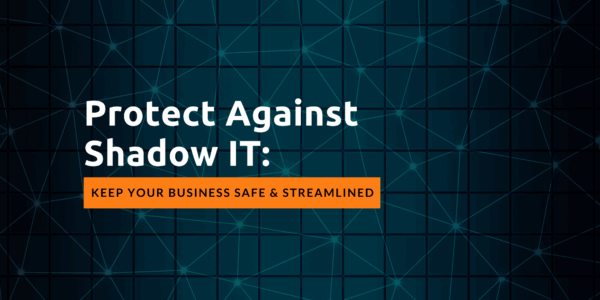Artificial intelligence is transforming how businesses operate. From automating workflows to generating insights, AI can…

What a Cybersecurity Engineer Can Do to Secure Your Network
Cyber security attacks are big business in today’s technological world – so big that they drain businesses’ funds by $10.3 billion on an annual basis.
This is why a cybersecurity engineer is so important for your business. They play an integral role in protecting your organization’s digital landscape, and most importantly, your cloud-based networks.
But what exactly does a cybersecurity engineer do and how can they add to your business? Check out the rest of this blog for more on how this team member can protect your business, reputation, and your sanity.
What Is a Cybersecurity Engineer?
Behind every single smooth, unhindered, and secure online transaction is the work of a cybersecurity engineer. It is their job to act as the frontline defense behind all of your business’s network transactions – especially cloud-based ones.
Essentially, they are experts in building and maintaining network defenses, ensuring everything you do online is protected. They develop network security strategies that act as cyber threat prevention.
It’s their job to shield valuable data from cyberattacks and optimize your digital traffic flow. The right cybersecurity engineer will ensure your network is well-protected while optimizing the performance of all your digital transactions.
Here are a few examples of actionable items they’ll put in place within your business:
- Conduct audits of your business’s network to determine the best security measures
- The design and implementation of firewalls
- Configuration of VPNs (virtual private networks)
- Implementation of intrusion detection systems to avoid hacking and cyberattacks
- Regular vulnerability assessments to detect weak spots within your network
Once an experienced engineer has conducted audits and put the best security systems in place, it’s their job to stay vigilant. This means continuous monitoring of your network.
They’ll also work closely with your IT team to develop network and IT protocols to ensure good security practices within your business. Digital risk management is a huge part of their everyday job.
What Skills Does a Cybersecurity Engineer Have?
As a business owner, you might find yourself wondering if it’s really necessary to hire a cybersecurity engineer. Can you not just do it all yourself, within your existing IT team?
The truth is that yes, you could. But ultimately, your network security will come up short. Qualified and experienced security engineers have the insider know-how that your IT team might be missing. They also know what to look for in terms of vulnerabilities within your network, along with the best IT security solutions.
Here are some of the crucial skills that a qualified security engineer will have:
Strong Programming Skills
Your average data security engineer has a wide breadth of knowledge when it comes to programming languages. With so many in use today, it’s absolutely critical that the engineer you hire has this skill.
They use these programming skills to evaluate and build the best possible data protection methods for your network. Not only this, but they use these languages to break down and deconstruct complicated codes that can be malicious.
It’s usually these complicated codes that attackers use to infiltrate business networks. Cybersecurity engineers are well-versed in general-purpose languages such as Python and C++. However, they should also understand other coding languages specific to your network and application work.
In-Depth Penetration Testing
This type of testing is paramount to your network security. Without it, you can never really know how strong your cybersecurity measures are and where your vulnerable spots might be.
An experienced engineer will have a good knowledge and understanding of penetration testing and its importance. They can thoroughly assess penetration tests and work with other pen testers to stay abreast of new threats within the industry.
Real-Time Threat Assessment
According to research conducted by IBM, it takes the average business 49 days to identify a ransomware attack. When it comes to cybersecurity vulnerability, this is massive.
This is why you need a cybersecurity engineer on your side who can catch these types of attacks (and others) much faster. In real-time, if possible. An experienced engineer will have the depth of knowledge on what to look for.
In addition to this, they can help to keep your network and general IT environment healthy by troubleshooting everyday problems.
Strong Organization Skills
Most cybersecurity engineers are critical thinkers, making them exceptionally organized people.
It’s their job to document and maintain protocols and procedures. They need to be organized and on the ball for this part of their job. It’s unlikely that you’ll find an engineer without this personality type.
The Average Day in the Life of a Cyber Engineer
What does a cybersecurity engineer do on a daily basis? Let’s take a closer look:
- They usually start their day by reviewing alerts and logs from the night before, highlighting any unusual activity
- After this, they might attend a morning meeting with the IT team to discuss any new threats or vulnerabilities in the network
- They might also discuss ongoing security and testing projects and determine what to tackle next
- A security engineer will then spend the majority of their day refining security architecture where needed. They might also troubleshoot security issues, or collaborate on new technology updates within the business
In between all of this, they’ll most likely attend a few meetings with regards to IT updates. They’ll also participate in training sessions to increase security awareness.
Why Your Business Needs Cybersecurity Talent
Aside from the obvious (data and network protection), hiring the expertise of a cybersecurity professional goes a long way. In terms of how it benefits your business, let’s take a deeper dive into why:
Stay Ahead of Cyber Attacks
The key to avoiding the disastrous effects of a cyber attack is stopping them before they even happen. Once a hacker or malicious malware has infiltrated your network, the damage is already done.
One of your business’s top IT security solutions is to hire a cybersecurity expert who is well adept at identifying these threats. With over 2,200 cybersecurity attacks occurring every single day across the globe, it’s not hard to see why prevention is better than cure.
But what are some of the most common cyber threats your business might face?
- Malware which consists of malicious software. It generally infiltrates into your network via links, emails, or infected websites
- Ransomware which is closely linked to malware. This is where your business data becomes encrypted by a hacker. Your business will have to pay a ransom to release the encrypted data
- Phishing scams: this usually consists of dangerous emails or texts that entice you to click on a link which then installs harmful software onto your computer.
- Poor password protection: there is nothing that puts your business network at risk like poor password protection. This leaves your business infrastructure vulnerable to any type of cyber attack
- Insider threats: this usually consists of an employee with ill intent to cause damage to a company’s network or IT infrastructure. It’s far more common than you think, with up to 74 percent of global businesses vulnerable each year
To add to this, the rate of attacks is expected to increase year on year. This is why proactive measures are so important for your business. The expertise of a cybersecurity engineer acts as the ultimate line of defense.
They can implement strategies and tools, antivirus programs, and firewalls to look for and counter these attacks.
Unbeatable Data Protection
The role of a cybersecurity engineer does not only center on identifying network attacks or stopping them in their tracks. It also involves robust data protection. This is part of the proactive plan to protect your business.
What type of data does a cyber engineer focus on protecting?
- Your company’s finances
- Intellectual property
- Industry know-how or insider trade information
- Customer/patient information
- Employee information
All of this data is super sensitive and when compromised, can do irreparable damage to your business. The expertise of a cyber engineer ensures this data remains private and protected from both inside and outside threats.
Some common data protection methods include:
- Installation of firewalls and encryption. This is to safeguard data from unauthorized access or outside threats by making it unreadable to people who don’t have access to it
- Implementation of user permissions. This includes access controls, setting up accounts for employees and specific departments
- Strong password encryption. A cybersecurity professional can assist with formulating passwords that can stand up to inside or outside threats
- Predetermined access. They can also establish protocols that only enable certain employees access to data or information, reducing the risk of insider threats
Their job is to also implement data backups on a regular basis. For example, if your data was hacked and stolen, this means that you’d have copies of backed-up data that can be restored.
It Saves You Time and Money
There’s no denying how much harm a cyber attack can have on your business. The financial implications are the biggest stressor for all business owners.
With global cost of cyber-attacks and data breaches is at an all-time high. Thanks to the covid-19 pandemic, the amount of cyber crime has doubled.
Over the past few years, the cost of business losses has reached a staggering amount of over $8.4 trillion. These types of financial losses are the kind that many businesses struggle to recover from.
If you don’t want to become another statistic, it’s vital that you secure your network, using the right professionals to do so. This is the best way to reduce your exposure to potential cyber threats, and save your business a ton of money.
Whether you choose to outsource your IT talent and data security or build an in-house team, this is the most cost-effective way of protecting your business.
Outsourcing is a good way to set a fixed monthly budget for your IT and data protection spending. This way you know where your money is going, tackling business threats before they even happen.
If you have a bigger budget, you could hire an IT security engineer on a contract basis. You can tap into their expertise to help you build cost-effective strategies whenever you need them.
You might be pressed for time within your business or maybe you just don’t have the team members or the bandwidth to tackle network security.
This is where outsourcing to professionals or hiring an in-house team can save you time, as well as money.
Cybersecurity Can Save Your Reputation
Everyone knows that a business’s reputation is everything. Hiring the right security engineer can go a long way in protecting you and everything sacred about your business.
A simple scenario is if your business experiences a data breach and sensitive information makes its way out to the public. This might be insider trade secrets, intellectual property, or private customer data. Or all of the above.
While the implications of this are huge, the loss to your reputation is even bigger. Along with financial losses, a damaged reputation is very difficult to recover from.
This type of breach can damage your reputation in the eyes of your shareholders, your customers, your employees, and even among the general public.
Aside from harmful data breaches, a cyber engineer can ensure your business remains compliant with all relevant rules and regulations.
Failing to comply with certain rules and regulations within your industry can result in penalties, and even worse, a tarnished reputation.
Maintaining a commitment to compliance helps you to build better business relationships. It also shows your shareholders, customers, and employees that you are trustworthy and reliable.
Secure Your Network, Protect Your Business
No matter what your business goals are, one of them should always center on protecting your business network. This is especially important if you have a business in the IT, construction, legal, or healthcare fields as these industries face constant pressure to meet regulatory compliance. They’re also the most vulnerable.
This is where the expertise of a cybersecurity team, such as ours at Terminal B, can make a real difference. If you’re in search of a cybersecurity engineer you can trust, backed by an entire team of experienced professionals, contact us today to fortify your network.


